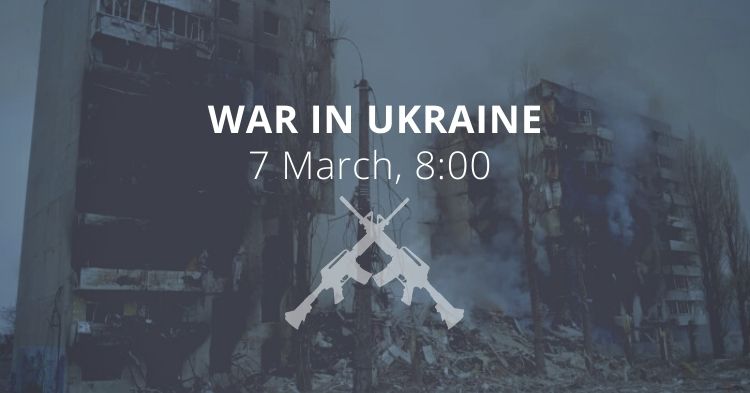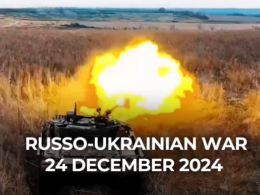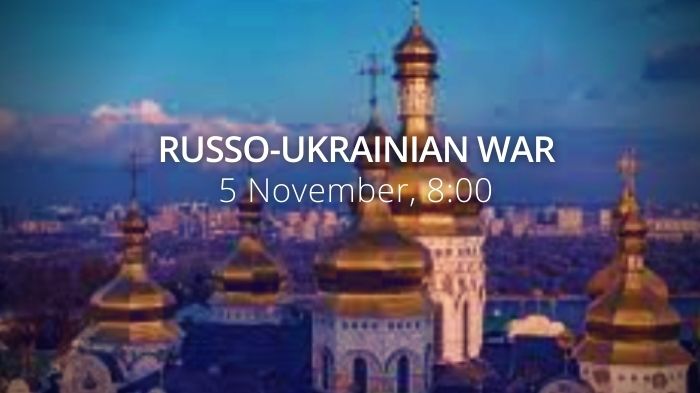Catch up with the latest news from and related to Ukraine. Our patrons get this daily digest as a newsletter delivered to their inbox; become one of them here.
Quick fire
- Russian-led occupying forces launch 7 attacks on Ukrainian positions in Donetsk, Luhansk and Mariupol sectors, incl heavy artillery and weapons banned by Minsk.
- As of 19:30 Dec 8, OSCE SMM recorded 815 violations, incl 146 explosions in Donetsk Obl; 32 violations, incl 10 explosions in Luhansk Obl.
- 2 Ukrainian soldiers wounded; 1 seriously
- Gunfire directed at OSCE SMM UAV near non-gov’t-controlled Kashtanove, Donetsk Obl & Kruhlyk, Luhansk Obl.
- Deputy Head of Presidential Office Andriy Sybiha stated President Zelensky is ready for direct talks with Putin.
- If Russia decides to attack, the Ukrainian army can’t repel the enemy without serious military assistance from the West, says Gen Kyrylo Budanov, head of Ukraine's military intelligence
- Peaceful settlement stalled as EU contributed to the militarization of Ukraine, claims Mariya Zakharova, press rep of Russian MFA
- Germany's new chancellor, Olaf Scholz: "For security & cooperation in Europe, the integrity of borders is the most important principle that works for everyone as it enhances our common security,"
- Ukrainian defense & security budget to grow by 10% in 2022; costs for equipment, weapons & hardware rise by 20%.
Assumptions of Biden's talk with Zelenskyy emerge: likely demands for Donbas autonomy, no NATO membership within 10 years
More assumptions have emerged from the phone conversation of US President Biden with Ukrainian President Zelenskyy, which took place on 9 December, two days after Biden spoke with Russian president Putin amid Russia's intensified saber-rattling along Ukraine's borders.
An AP article states that US administration officials have suggested that the US will press Ukraine to formally cede a measure of autonomy to occupied Donbas, now under the control of two Russian proxy "republics." The decentralization of Ukraine and a “special status” for Donbas were laid out in the Minsk protocol, but the plan has not proceeded to its political part because a military withdrawal had never taken hold.
As well, the article says that while the US and NATO reject Putin's demands to have guarantees Ukraine won't be admitted to the alliance, senior State Department officials have told Ukraine that NATO membership is unlikely to be approved in the next decade, according to a person familiar with those private talks who spoke on condition of anonymity.
"Ukraine may be asked “can you make some step forward on these areas,” said Steven Pifer, a former US ambassador to Ukraine. That could include measures such as allowing the Russia-allied Donbas region to control its own health care, police and schools, he said.
“But I don’t see Washington pushing the Ukrainians to take steps that would compromise their sovereignty or the ability of the national government when it came to making decisions,” Pifer said," AP wrote.
Ukrainian political prisoner, father of four who resisted Crimean occupation starts a hunger strike in Russian prison
Ivan Yatskin, who suffers from serious health issues, started a hunger strike in response to systematic pressure from prison staff. As a person who helped the Ukrainian army and was accused of state treason under Russian law, Ivan Yatskin is recognized as a Ukrainian political prisoner of the Kremlin by the Crimea Human Rights Group.
Russia charges Ukrainian military analyst with 'state treason', threatening 20-year sentence
51-year-old Dmytro Shtyblikov should have been released on 10 November 2021, after five years in Russian captivity. Instead, Russia’s FSB came up with new charges, as surreal and implausible as the original ‘Crimean saboteur’ accusation used to imprison him, fellow military analyst Oleksiy Bessarabov and Volodymyr Dudka, a retired naval captain. This time, the Ukrainian is accused by the Russian regime that invaded Ukrainian Crimea under Russian law of ‘state treason’. More here.
Volunteer imprisoned by Donbas militants for helping orphaned children receives Ukraine’s National Human Rights Defender award
Lyudmila Huseinova has become the 2021 laureate of Ukraine’s National Human Rights Defence Award, although it may be some time before she learns of this. The civic volunteer and defender of children’s rights in occupied Novozavovsk has been imprisoned in the self-proclaimed and Russian-controlled ‘Donetsk people’s republic’ [DNR] since October 2019. Read more.
Western sanctions cause “huge problems” for Russia’s war sector (but Israel probably still supplies drone parts) – military expert
When we published the key points of the report “Weapons of War in Ukraine” by the UK-based investigative organization Conflict Armament Research, it caught our eye that between 2014 and 2018, the drone manufacturer Israel Aerospace Industries supplied a sanctioned Russian defense company with UAV components produced by various European and US manufacturers, thus providing a loophole for sanctions evasion.
To understand whether it is used now, we reached out to military expert Mykhailo Samus, Director of the New Geopolitics Research Network, and found out how exactly Israeli technologies are helping Russia today, when western companies decided that it’s not worth the risk supplying war technologies to Russia, and that, paradoxically, Ukraine is still under an unofficial arms embargo from countries of Western Europe.
Russia's claims to Ukrainian warship "Donbas" in Kerch Strait pure psy-op, maritime expert says
On 9 December, Russia caused an international stir by claiming that a Ukrainian Navy ship was undermining maritime security by passing through the Kerch Strait to the Azov Sea (which since 2003 is an "internal sea" of Russia and Ukraine, meaning that any ship of both countries can freely pass at any time), and threatening to open fire on the Ukrainian ship. The Ukrainian ship, as usual, responded by saying it has full rights to these waters and continued as usual. These incidents happen on a daily basis and had gone unreported until 9 December. A military expert explains why Russia's messaging is a psy-ops.
The US Embassy reaffirmed Ukraine's right to navigation in the Azov Sea:

The Ukrainian Navy responded by outlining how Russia hinders free navigation in the Azov Sea -- it has currently blocked 70% of it.
As of today, #Russia has blocked about 70% of the Sea of Azov and systematically hinders free navigation there, the Ukrainian Navy informed.
Russia allegedly had issued systematic navigational warnings about restrictions on navigation in certain areas, which impedes navigation pic.twitter.com/60jki2TI0Q
— Hromadske Int. (@Hromadske) December 10, 2021
Russian MFA demands NATO rescind promise of membership to Ukraine
Russia demanded on Friday that NATO rescind a 2008 commitment to Ukraine and Georgia that they would one day become members and said the alliance should promise not to deploy weapons in countries bordering Russia that could threaten its security. The demands were spelt out by the Russian foreign ministry in its fullest statement yet on the security guarantees that President Vladimir Putin says he wants to obtain from the United States and its allies. Read more here.
The demand that NATO not expand eastward is one of Russia's long-standing ones. Lately, it was first dropped on 1 December, after a month of increasing tensions that had experts worldwide guessing whether Russia would invade Ukraine (again). We asked experts what to make of this ultimatum; read their answers here.
Biden infuriates eastern NATO allies with offer to hold negotiations with Russia
Bloomberg reported, citing anonymous sources in diplomatic circles, that countries on NATO's eastern flank have been very critical of US President Joe Biden's idea of discussing with Russia its claims to the Alliance's enlargement, including Ukraine's accession, with only part of the Alliance's "key countries." On 9 December, Biden spoke with nine of them, who are part of the Bucharest Nine group: Bulgaria, Czechia, Estonia, Hungary, Lativa, Lithuania, Poland, Romania, and Slovakia.
"The leaders discussed Russia’s destabilizing military buildup along Ukraine’s border and the need for a united, ready, and resolute NATO stance for the collective defense of Allies. President Biden stressed the US commitment to continued close consultation and coordination with all our Transatlantic Allies and partners as we work towards de-escalation of the current crisis through deterrence, defense, and dialogue," a White House readout reads.
Putin claims Ukraine committing "genocide" in Donbas
The Russian president's remarks on Thursday were aimed at addressing the issue of discrimination against Russian speakers beyond Russia's borders, many of whom live in the Donbas region of eastern Ukraine. He said that Russophobia was the first step towards genocide.
"We see and know what is happening in Donbas," he said, referring to the conflict zone. "It certainly looks like genocide."
New technological university aims to shift Ukraine’s IT from outsourcing to local product
Ukraine is a source of IT specialists globally, but they mainly work for foreign companies. A new technological university has opened in Kyiv to change that and make Ukraine not only a source of specialists but a source of innovation.
Called SET University, which stands for “Science. Entrepreneurship. Technology,” it promises to be different from existing facilities by educating not just IT specialists but also IT entrepreneurs. Students will study artificial intelligence technologies, defend startup ideas instead of a thesis, and pay for tuition with a percentage of their future salaries.
72% of Ukrainians see Russia as enemy
New poll: 72% of Ukrainians regard Russia as an enemy while just 12% now see the country as an ally. These figures reflect the unprecedented collapse in bilateral relations as a result of Putin’s self-defeating war pic.twitter.com/bF6sVhgfEb
— Business Ukraine mag (@Biz_Ukraine_Mag) December 10, 2021
Elle switches from Russian to Ukrainian
This month’s Elle magazine is in Ukrainian, for the first time. Women’s fashion magazines, and magazines overall in Ukraine, were overwhelmingly published in Russian. It was believed that Ukrainian would make them uncompetitive. Elle’s transition is the latest in a line of media outlets that have switched to Ukrainian in the recent months, including Novoie Vremia, Censor.net, Forbes, and Lb.ua.

Ukraine's Foreign Minister's article in Foreign Affairs
Dmytro Kuleba penned an article titled "Don’t Sell Out Ukraine:"
"Russian President Vladimir Putin has issued a stark ultimatum. In a number of recent statements, he has demanded that the United States make “reliable and firm legal guarantees” that NATO will not expand eastward—or else, his entourage has hinted, Russia will invade Ukraine. Coming at a time when Russia is massing military forces along the Ukrainian border and stymieing peace talks to end the war in the Donbas region, Putin’s demand seems to offer a tempting prospect for the West: in exchange for merely cementing the alliance’s status quo, a deadly European war could come to an end and a new, even more devastating conflict could be avoided.
But it is foolish to think that providing such a guarantee would make Putin any less aggressive. History shows that pledges of neutrality by Ukraine or any other country in the region do nothing to abate Putin’s appetite; rather, they feed it. The best way to respond to such ultimatums is to ignore them altogether."





